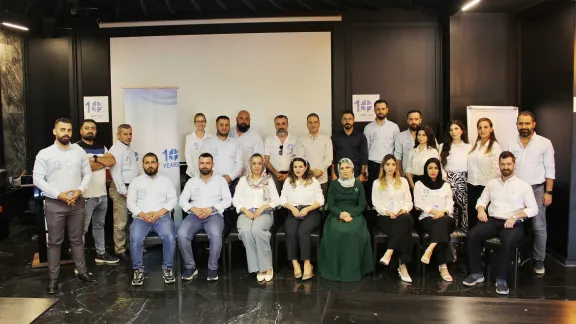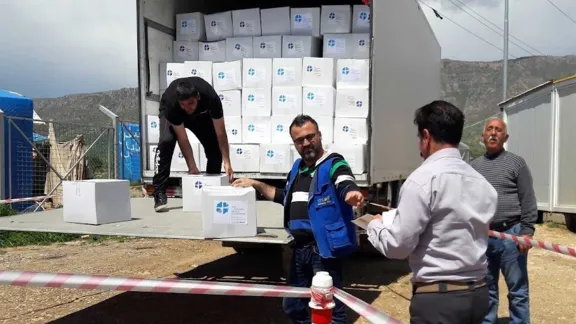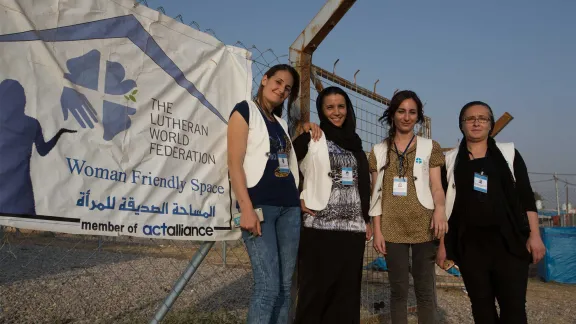
The LWF Iraq team celebrating 10 years. Almost all staff are national or even local staff. Photo: LWF Iraq
LWF marks tenth anniversary of support to displaced communities in Northern Iraq
(LWI) – In 2014, LWF set up an emergency relief operation in response to the Islamic State (IS) insurgency, which displaced around three million people in Iraq within a year. Through the LWF World Service program in Jordan, the LWF provided essential supplies to displaced people, focusing on the Kurdish Region of Iraq (KRI), where most had gathered.
Responding to “huge needs”
"It was chaos." Nabeel Gorgees, who has been serving as LWF Iraq Logistics Officer since the beginning, remembers the impact of the massive displacement in Dohuk. "There were not yet any IDP camps. People were sleeping under the trees and in unfinished buildings." People who had lost everything sheltered in schools and church buildings. Several families shared a room, often only separated by pieces of furniture. "There was a lack of security because people lived in open shelters and areas."
Gorgees remembers long working days, "sometimes till after midnight," as the team and local partners tried to meet the "huge needs" in a race against time and the approaching winter. "At that time, only a few organizations were working in the Kurdistan region of Iraq. We never thought we would face a crisis like this. LWF distributed food and supplies, such as blankets, kerosene heaters, and hygiene kits. We also improved shelters, like unfinished buildings, so that people could stay warm."
LWF also provided psychosocial and specialized assistance to persons with disabilities and other vulnerable groups. Among those were many women and girls from the Yazidi community who the so-called IS had enslaved. They also provided psychosocial support, especially to Yazidi women and girls who had been enslaved by IS, creating safe spaces in IDP camps and facilitating trauma recovery with local partners.
Pandemic setback
As displacement persisted, even after IS ceased to be a threat, LWF continued offering food, water, hygiene supplies, and psychosocial aid. When the COVID-19 pandemic hit, it reintroduced emergency food aid. Many IDPs had started earning money in the low-income sector and lost their jobs during the lockdowns. Families again depended on food distributions. The pandemic also exacerbated domestic and gender-based violence – addressing the "shadow pandemic" became a focus for the country program again.

Nabeel Gorgees during a distribution in the program’s early days, in 2014. Photo: LWF Iraq
After the pandemic, the country program focused on WASH infrastructure, providing protection services to survivors of IS captivity, and working with community members to address conflict and rebuild trust. They also rebuilt their livelihoods again. Through different financial and entrepreneurship training formats, they supported young people and former businessmen and women in accessing loans and (re-) starting a small or medium enterprise.
Stable livelihoods
A pioneer project in this was the PROSPECTS initiative. This public-private partnership aimed to provide work opportunities for 1,000 women and men in Dohuk and Nineveh regions. Some participants have already successfully restarted their businesses and are employing other community members.
By working as true partners and honoring local knowledge and expertise, we have reached more people, learned from each other, and strengthened our collective efforts.
Rebecca DUERST, LWF Iraq Country Representative

The LWF team working at a women-friendly space in Dawodiya IDP camp, 2016. Photo: LWF/ Elma Okic
Today, ten years after the fall of Mosul, Iraq still hosts 1.14 million displaced people and over 300,000 refugees. According to Helan Remzi Muhammed, LWF Iraq Program Coordinator, socio-economic factors, human rights deficits, and the lack of rule of law now drive the ongoing needs. Marginalized groups face the greatest difficulty accessing public services.
LWF Iraq Representative Rebecca Duerst emphasized future efforts to empower local communities, foster resilience to climate change, and promote climate justice. This month, however, the team took a moment to celebrate its achievements over the past decade, with gratitude for the partnerships that helped rebuild lives across the region.
"Without our partners, we could not have accomplished all we have over the last ten years. By working as true partners and honoring local knowledge and expertise, we have reached more people, learned from each other, and strengthened our collective efforts."


